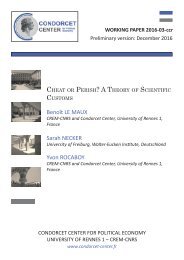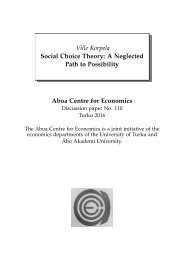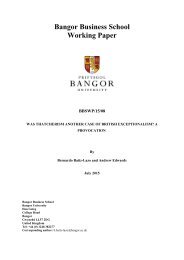MEMORANDUM
n?u=RePEc:hhs:osloec:2016_018&r=hpe
n?u=RePEc:hhs:osloec:2016_018&r=hpe
Create successful ePaper yourself
Turn your PDF publications into a flip-book with our unique Google optimized e-Paper software.
interested in seeing their son again but it seems surprising that it would happen via an<br />
official appointment by the Soviet government.<br />
The Berlin office of the Soviet Ministry of Finance was part of the Soviet legation.<br />
The ambassador had since 1921 been Nikolai N. Krestinsky, a Bolshevik since 1903 who<br />
had been Commissar of Finance and held high-ranking political posts. After siding with<br />
Trotsky in the power struggle with Lenin since 1921 he had been demoted but found<br />
trustworthy enough to take on the important post of ambassador in Berlin.<br />
There were, however, some means in the Leontief textile factory which had escaped<br />
confiscation. One of Leontief Sr.’s step sisters had at the end of the nineteenth century<br />
married a Russian born entrepreneur who had been naturalized in England and owned a<br />
machinery factory in Manchester. The Leontief textile factory had outstanding credit with<br />
this firm from advance payments on orders that were cancelled. To have these funds<br />
returned to Russia would have run the risk of confiscation. Leontief’s father was in a<br />
position to dispose of these financial assets after moving to Germany in 1927. 85<br />
Leontief’s time in Berlin coincided with the best years of the Weimar republic. Berlin<br />
had a particularly lively cultural scene in 1925-1927. Leontief could hardly afford the time<br />
and money to enjoy very much of it. But he enjoyed the theatre and there were cheap<br />
tickets to be had. He also went to concerts, often they were concert rehearsals of the Berlin<br />
Philharmonic, conducted by the legendary Wilhelm Furtwängler. 86 Another memory was<br />
the Brecht/Weill Dreigroschenoper, which premiered in 1928.<br />
After the three Gasthörer semesters Leontief reckoned at the end of 1926 that he<br />
needed only two semesters as matriculated student to complete his dissertation. He<br />
proceeded accordingly and completed the dissertation over the next two semesters. But the<br />
swift rush through the doctoral study met at first with disapproval by the university and<br />
skepticism in the Ministry supervising the universities. Leontief won through the<br />
administrative hindrances thanks to support from his doctoral advisors, Bortkiewicz and<br />
Sombart, but also from others. His doctoral dissertation was approved and the oral exam<br />
passed in the beginning of 1928 by which time Leontief had already worked at started to<br />
work at Institute für Weltwirtschaft in Kiel.<br />
The administrative entanglements that needed to be resolved, are recounted in some<br />
detail below, as well as details of the evaluation of Leontief’s dissertation, and his oral<br />
examination. But first a brief look at two articles published by Leontief during his Berlin<br />
85 This is another shrouded issue in the Leontief family history but may indicate that Leontief Sr. in<br />
the access to the funds had the support of his family in Leningrad.<br />
86 Wilhelm Fürtwangler was the principal conductor 1922-1945 and maintained within reason an<br />
anti-nazi stand until the end, while Herbert von Karajan with a different attitude was waiting<br />
eagerly in the wings to replace him.<br />
28





